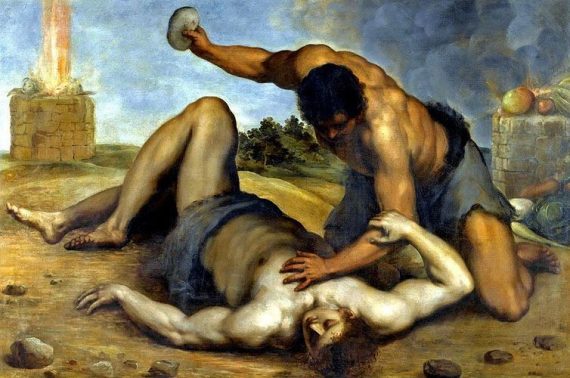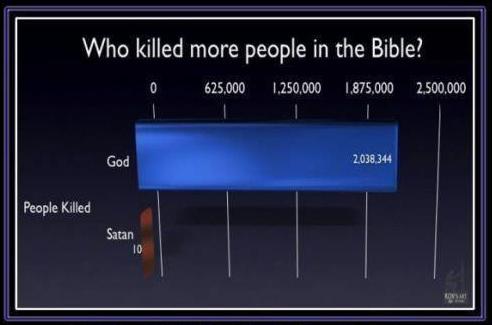Genesis 4:8 contains the account of Cain murdering his brother Abel. This is the first death in Scripture and reveals something significant about death and violence.

If you have been listening to my podcast for the past year, you may recall that as we were working our way through Genesis 3, I kept mentioning the six foundational and revolutionary truths from Genesis 2, 3, and 4. We looked at the first 5 of these, and then I haven’t really mentioned too much more about them. So maybe you were thinking, “Hey! What about the sixth?”
Well, that is what we are finally getting to today. Genesis 4:8 contains the sixth and final revolutionary and foundational truth. Understanding this will help you understand the Bible, God, yourself, your relationships, politics, economics, history, and pretty much everything else that goes on in the world.
The Text of Genesis 4:8
Now Cain talked with Abel his brother; and it came to pass, when they were in the field, that Cain rose up against Abel his brother and killed him.
In this discussion of Genesis 4:8 we look at:
- The murder of Abel by Cain
- Why the first death in Scripture is a fratricide
- The sixth foundational and revolutionary truth from Genesis 2–4
- What Genesis 4:8 teaches us about God, ourselves, Scripture, history, politics, economics, and pretty much everything else in life.
Resources:
- Become a Member of RedeemingGod.com
- Myers, The Atonement of God
- Subscribe and Leave a Review on iTunes
Downloadable Podcast Resources
Those who are part of my online discipleship group may download the MP3 audio file for this podcast and view the podcast transcript below.
You must join a discipleship group or login to download the MP3 and view the transcript.
Thanks for visiting this page ... but this page is for Discipleship Group members.
If you are already part of a Faith, Hope, or Love Discipleship Group,
Login here.
If you are part of the free "Grace" Discipleship group, you will need to
Upgrade your Membership to one of the paid groups.
If you are not part of any group, you may learn about the various groups and their benefits here:
Join Us Today.

Do you like learning about the Bible online?
Do you like learning about Scripture and theology through my podcast? If so, then you will also love my online courses. They all have MP3 audio downloads, PDF transcripts, quizzes, and a comment section for questions and interaction with other students.
If you want to deepen your relationship with God and better understand Scripture, take one (or all) of these courses. They are great for personal study or for a small group Bible study.
You can see the list of available courses here, and if you join the Discipleship group, you can take all the courses at no additional cost. Go here to learn more and join now.
![[#56] Genesis 4:8 – The Founding Murder](https://redeeminggod.com/wp-content/uploads/2016/11/cain-slaying-abel-jacopo-palma-1590-150x150.jpg)
![[#55] Genesis 4:6-7 – The First Sin in the Bible](https://redeeminggod.com/wp-content/uploads/2016/10/anger_by_kwerfeldein-150x150.jpg)
 If I were to ask you when the first sin in the Bible occurs, you might point to Genesis 2 when Adam and Eve eat from the Tree of the Knowledge of Good and Evil. Yet did you know that their actions in Genesis 2 are not referred to as “sin”?
If I were to ask you when the first sin in the Bible occurs, you might point to Genesis 2 when Adam and Eve eat from the Tree of the Knowledge of Good and Evil. Yet did you know that their actions in Genesis 2 are not referred to as “sin”?


 For all the mentions of human violence, references to divine violence appear almost twice as often.
For all the mentions of human violence, references to divine violence appear almost twice as often. Though innocent of any wrongdoing, God, in Jesus, let us blame Him for every wrongdoing.
Though innocent of any wrongdoing, God, in Jesus, let us blame Him for every wrongdoing.

 At times God appears violent, not because He is violent, but because, just as Jesus on the cross took the sin of the world upon Himself, so also God in human history, took the violence of humanity upon Himself.
At times God appears violent, not because He is violent, but because, just as Jesus on the cross took the sin of the world upon Himself, so also God in human history, took the violence of humanity upon Himself. How can a God who says "Love your enemies" (Matthew 5:44) be the same God who instructs His people in the Old Testament to kill their enemies?
How can a God who says "Love your enemies" (Matthew 5:44) be the same God who instructs His people in the Old Testament to kill their enemies?

 How can you know if you, or a friend, or relative, have committed the unforgivable sin?
How can you know if you, or a friend, or relative, have committed the unforgivable sin? But be warned.
But be warned.